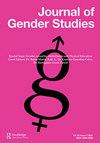透明和性别认同
IF 1.5
3区 社会学
Q2 SOCIAL ISSUES
引用次数: 0
摘要
本文章由计算机程序翻译,如有差异,请以英文原文为准。
Transparent and the optics of gender(ed) identity
ABSTRACT Using ‘the transparent’ as its lens, this article discusses three scenes from Joey Soloway’s Transparent, aiming to trace how it invites reflection on the advantages and risks of visibilisation as well as on the plights and recompenses of invisibility. When scholars from political science, social science or economics discuss transparency, many share an overwhelmingly positive understanding of it, which has, lately, come under pressure. Adding to this critique, I argue that Transparent draws attention to the fact that transparency, particularly for the queer subject is deeply ambivalent. To back up this claim, I offer close readings: i) of the establishing shot, which breaks the 180°-rule to warn against trusting what is offered to be seen; ii) of a scene in which Maura describes withstanding pressure from the heteronormative gaze, and iii) a scene in which Ali begins to interrogate her own practices of in_visibilisation. Through its mise-en-scène, this last example offers ‘the translucent’ as an alternative term, a middle ground between a potentially oppressive, isolating and thus silencing invisibility and a potentially exposing, objectifying and thus threatening visibility.
求助全文
通过发布文献求助,成功后即可免费获取论文全文。
去求助
来源期刊

Journal of Gender Studies
Multiple-
CiteScore
4.40
自引率
0.00%
发文量
52
期刊介绍:
The Journal of Gender Studies is an interdisciplinary journal which publishes articles relating to gender from a feminist perspective covering a wide range of subject areas including the Social and Natural Sciences, Arts and Popular Culture. Reviews of books and details of forthcoming conferences are also included. The Journal of Gender Studies seeks articles from international sources and aims to take account of a diversity of cultural backgrounds and differences in sexual orientation. It encourages contributions which focus on the experiences of both women and men and welcomes articles, written from a feminist perspective, relating to femininity and masculinity and to the social constructions of relationships between men and women.
 求助内容:
求助内容: 应助结果提醒方式:
应助结果提醒方式:


